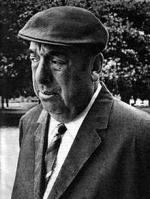Disable ads!
Pablo Neruda
Pablo Neruda (/nəˈruːdə/; Spanish: [ˈpaβ lo ne ˈɾuð a]) was the pen name and, later, legal name of the Chilean poet-diplomat and politician Neftali Ricardo Reyes Basoalto (July 12, 1904 – September 23, 1973). He derived his pen name from the Czech poet Jan Neruda. He won the Nobel Prize for Literature in 1971. Neruda became known as a poet while he was still a teenager. He wrote in a variety of styles, including surrealist poems, historical epics, overtly political manifestos, a prose autobiography, and erotically charged love poems such as the ones in his collection Twenty Love Poems and a Song of Despair (1924). He often wrote in green ink, which was his personal symbol for desire and hope. The Colombian novelist Gabriel García Márquez once called Neruda "the greatest poet of the 20th century in any language." Harold Bloom included Neruda as one of the 26 writers central to the "Western tradition" in his book The Western Canon. Neruda's love poems are widely regarded as some of the most romantic poetry ever written. On July 15, 1945, at Pacaembu Stadium in São Paulo, Brazil, Neruda read to 100,000 people in honor of the Communist revolutionary leader Luís Carlos Prestes. During his lifetime, Neruda occupied many diplomatic positions and served a term as a Senator for the Chilean Communist Party. When President González Videla outlawed communism in Chile in 1948, a warrant was issued for Neruda's arrest. Friends hid him for months in the basement of a house in the port city of Valparaíso. Later, Neruda escaped through a mountain pass near Maihue Lake into Argentina. Years later, Neruda was a close advisor to Chile's socialist President Salvador Allende. When Neruda returned to Chile after his Nobel Prize acceptance speech, Allende invited him to read at the Estadio Nacional before 70,000 people. Neruda was hospitalised with cancer at the time of the coup d'état led by Augusto Pinochet. On 23 September 1973, Neruda died of prostate cancer in his house in Isla Negra. Pinochet, backed by elements of the armed forces, denied permission for Neruda's funeral to be made a public event. However, thousands of grieving Chileans disobeyed the curfew and crowded the streets.
 Read more on wikipedia.org Read more on wikipedia.org
 All quotes by Pablo Neruda All quotes by Pablo Neruda
 Edit Edit
|

|
|
|
|
|
Background photo by Giuliana
|